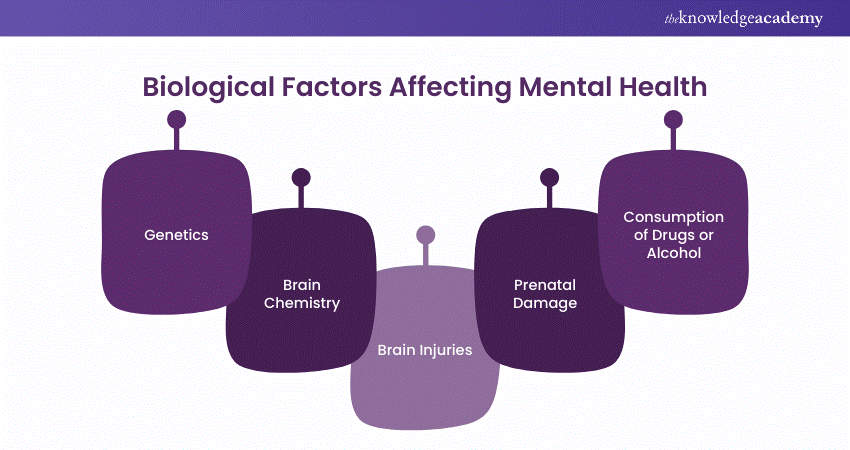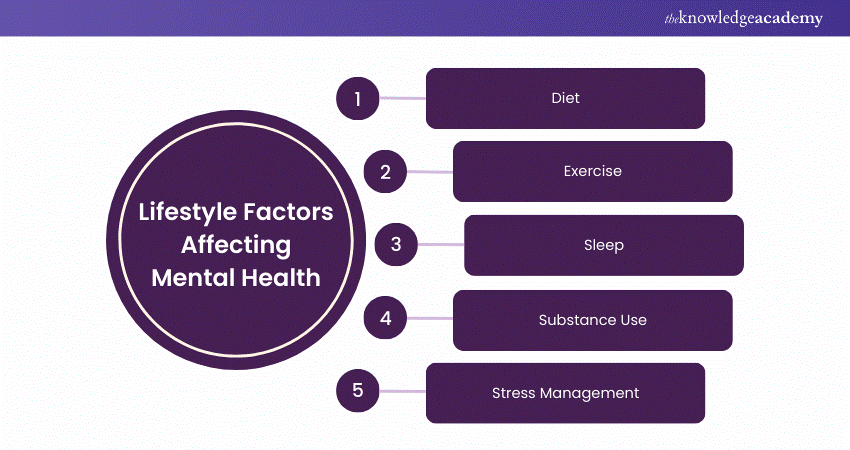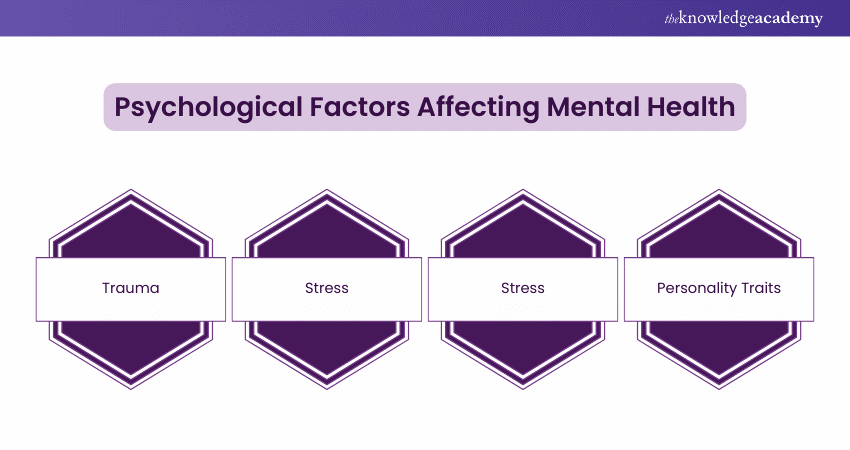We may not have the course you’re looking for. If you enquire or give us a call on 01344203999 and speak to our training experts, we may still be able to help with your training requirements.
Training Outcomes Within Your Budget!
We ensure quality, budget-alignment, and timely delivery by our expert instructors.

Imagine a world where we understand the secrets behind our moods and behaviours. What if we could pinpoint the biological factors that shape our emotions or identify the environmental triggers that increase our stress? By exploring the Factors Affecting Mental Health, we can start a journey of self-discovery and reflection on our own experiences.
Join us as we delve into the layers of mental health, examining the various Factors Affecting Mental Health. Discover the mysteries of your mind and gain a deeper understanding of why you feel, think, and react the way you do. Let’s explore together and find the keys to a healthier, more balanced life.
Table of Contents
1) Biological Factors Affecting Mental Health
2) Environmental Factors Affecting Mental Health
3) Lifestyle Factors Affecting Mental Health
4) Psychological Factors Affecting Mental Health
5) Cultural and Societal Factors Affecting Mental Health
6) Conclusion
Biological Factors Affecting Mental Health
Biological factors play an important role in affecting mental health. Here are some biological factors that can affect your mental health:

1) Genetics:
a) Mental illnesses can be hereditary.
b) Example: A child of a parent with depression may have a higher risk.
2) Brain Chemistry:
a) Neurotransmitters transmit signals in the brain.
b) Imbalances in chemicals like serotonin and dopamine can cause disorders.
3) Brain Injuries:
a) Traumatic brain injuries can affect mood, behavior, and cognition.
b) Can lead to issues like depression, anxiety, and personality changes.
4) Prenatal Damage:
a) Harmful substances, infections, or malnutrition during pregnancy can impact brain development.
b) Increases risk of developmental disorders and cognitive impairments.
5) Substance Abuse:
a) Long-term drug or alcohol use can alter brain chemistry.
b) Raises risk of addiction, depression, and anxiety.
6) Infections:
a) Certain infections, like streptococcal infections, can cause brain damage.
b) Can lead to disorders such as Obsessive-Compulsive Disorder (OCD).
Environmental Factors Affecting Mental Health
1) Living Conditions:
a) Inadequate housing, overcrowding, and homelessness can lead to stress and anxiety.
b) These circumstances can adversely affect mental health by fostering feelings of insecurity and instability.
2) Pollution:
a) Exposure to air and water pollution can impair brain function.
b) Pollution has been associated with higher rates of mental health issues, including depression and anxiety.
3) Access to Green Spaces:
a) Limited access to parks and natural environments can elevate stress and anxiety levels.
b) Conversely, having access to green spaces can enhance mental well-being by offering a calming and restorative environment.
4) Socioeconomic Status:
a) Poverty and financial stress can contribute to mental health problems.
b) These factors create chronic stress and restrict access to mental health resources, such as therapy and medication.
5. Social Support Networks:
a) Strong social connections can protect against mental health problems.
b) Isolation and lack of support can increase the risk of mental health issues by reducing emotional and practical support.
Take the first step towards resilience with our Handle Stress and Develop Your Resilience Course – sign up now!
Lifestyle Factors Affecting Mental Health
Lifestyle Factors play an important role in affecting the Mental Health. Lifestyles factors includes individual choices and behaviours that can significantly affect the individual’s Mental Health. These choices made on the daily basis, either promote psychological well-being or contribute to the Mental Health issues. The following are some of the lifestyle Factors Affecting Mental Health.

1) Diet:
a) Poor nutrition, especially diets high in processed foods and sugars, can lead to depression and other mental health issues.
2) Exercise:
a) Physical activity improves brain function and mood. Lack of exercise can cause anxiety and depression.
3) Sleep:
a) Lack of sleep can cause mood problems and worsen mental health issues.
4) Substance Use:
a) Alcohol and drugs can harm mental health. Substance abuse can cause and worsen mental health disorders.
5) Stress Management:
a) Poor stress management can lead to chronic stress, increasing the risk of mental health problems.
Enhance your positivity skills by registering in our Positive Psychology Course now!
Psychological Factors Affecting Mental Health
Phycological factors include the internal aspects of an individual’s mental and emotional life that can significantly affect the overall mental well-being. These factors are interconnected with an individual’s psyche and play an important role in forming their complete personality. Identifying such factors helps in promoting Good Mental Health. The following are some of the psychological Factors Affecting Mental Health:

1) Trauma:
a) Childhood experiences of physical, emotional, or sexual abuse can lead to long-term mental health disorders like PTSD, depression, and anxiety.
b) Lack of emotional or physical care during childhood can cause attachment issues and mental health problems.
c) The loss of a loved one or other significant losses can trigger mental health disorders, including depression and anxiety.
2) Stress:
a) Ongoing stress from work, relationships, or other life circumstances can contribute to anxiety, depression, and other mental health issues.
b) Short-term stressors, such as major life changes or traumatic events, can also impact mental health.
3) Cognitive Patterns:
a) Negative thinking patterns, such as catastrophising (expecting the worst) or black-and-white thinking (seeing things as all good or all bad), can harm mental health.
b) Inadequate coping mechanisms for dealing with stress and adversity can lead to mental health issues.
c) Cognitive-Behavioral Therapy (CBT) often focuses on changing negative thinking patterns and improving coping skills to enhance mental health.
4) Personality Traits:
a) High levels of neuroticism, characterised by a tendency to experience negative emotions like anxiety, anger, and depression, can increase vulnerability to mental health disorders.
b) Traits such as perfectionism, low self-esteem, and high sensitivity to stress can also contribute to mental health issues.
Enhance your child psychology expertise by registering in our Child Psychology Course today!
Cultural and Societal Factors Affecting Mental Health
Here are some of the cultural and societal Factors Affecting Mental Health.
1) Stigma:
a) In many cultures, mental health is stigmatized and seen as a sign of weakness or something to be ashamed of.
b) These stigmas can discourage people from seeking care, leading to untreated mental health issues and worsening conditions.
2) Discrimination:
a) Experiences of racism, sexism, and other forms of discrimination can negatively impact mental health.
b) Discrimination causes chronic stress and feelings of loneliness, which can lead to mental health issues such as anxiety and depression.
3) Cultural Norms:
a) Cultural beliefs and customs affect how mental health worries are seen and addressed.
b) In some cultures, mental health concerns may be viewed as a personal flaw or weakness, avoiding people from seeking care and leading to untreated conditions.
4) Social Expectations:
a) Societal demands to achieve, adhere to set standards, or fulfil specified tasks can all lead to stress.
b) Individuals struggling to achieve these expectations may experience mental health issues such as anxiety, depression, and stress.
Conclusion
Understanding the Factors Affecting Mental Health empowers us to foster emotional well-being. By recognising the biological, psychological, and environmental influences, we can better navigate our experiences. Embrace this journey of self-discovery to cultivate resilience, improve mental health, and ultimately lead a more balanced and fulfilling life.
Unlock the secrets to mental well-being with our expert-led Mental Health Courses – join now!
Frequently Asked Questions

Anxiety disorders are the most commonly diagnosed mental health conditions globally. This category encompasses various disorders, including generalised anxiety disorder, panic disorder, and social anxiety disorder, impacting millions of people around the world.

Yes, others can significantly affect your mental health. Interactions with family, friends, and colleagues can influence your emotions and well-being, both positively and negatively, through support, conflict, and social dynamics.

The Knowledge Academy takes global learning to new heights, offering over 30,000 online courses across 490+ locations in 220 countries. This expansive reach ensures accessibility and convenience for learners worldwide.
Alongside our diverse Online Course Catalogue, encompassing 19 major categories, we go the extra mile by providing a plethora of free educational Online Resources like News updates, Blogs, videos, webinars, and interview questions. Tailoring learning experiences further, professionals can maximise value with customisable Course Bundles of TKA.

The Knowledge Academy’s Knowledge Pass, a prepaid voucher, adds another layer of flexibility, allowing course bookings over a 12-month period. Join us on a journey where education knows no bounds.

The Knowledge Academy offers various Mental Health, including Mental Health And Wellbeing Training, Anxiety Courses, Social Psychology Training and Child Psychology Course. These courses cater to different skill levels, providing comprehensive insights into Reduce Anxiety Immediately.
Our Health & Safety Blogs cover a range of topics related to Mental Health, offering valuable resources, best practices, and industry insights. Whether you are a beginner or looking to advance your Mental Health skills, The Knowledge Academy's diverse courses and informative blogs have got you covered.
Upcoming Health & Safety Resources Batches & Dates
Date
 Counselling Masterclass
Counselling Masterclass
Fri 13th Dec 2024
Fri 7th Feb 2025
Fri 4th Apr 2025
Fri 6th Jun 2025
Fri 8th Aug 2025
Fri 3rd Oct 2025
Fri 5th Dec 2025







 Top Rated Course
Top Rated Course



 If you wish to make any changes to your course, please
If you wish to make any changes to your course, please


